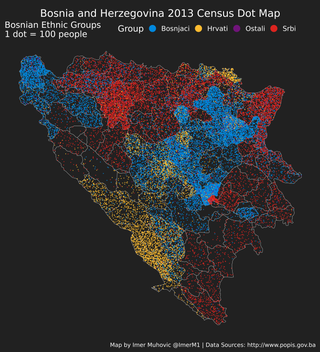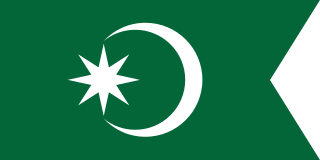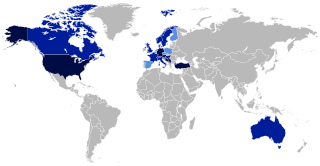Bosnian Muslims can refer to:

Alija Izetbegović was a Bosniak politician, lawyer, Islamic philosopher and author, who in 1992 became the first president of the Presidency of the newly independent Republic of Bosnia and Herzegovina.

More than 96% of population of Bosnia and Herzegovina belongs to one of its three autochthonous constituent peoples : Bosniaks, Serbs and Croats. The term constituent refers to the fact that these three ethnic groups are explicitly mentioned in the constitution, and that none of them can be considered a minority or immigrant. The most easily recognisable feature that distinguishes the three ethnic groups is their religion, with Bosniaks predominantly Muslim, Serbs predominantly Eastern Orthodox, and Croats Catholic.
"Muslims" is a designation for the ethnoreligious group of Serbo-Croatian-speaking Muslims and people of Muslim heritage, inhabiting mostly the territory of the former Socialist Federal Republic of Yugoslavia. The term, adopted in the 1971 Constitution of Yugoslavia, groups together a number of distinct South Slavic communities of Islamic ethnocultural tradition. Prior to 1993, a vast majority of present-day Bosniaks self-identified as ethnic Muslims, along with some smaller groups of different ethnicity, such as Gorani and Torbeši. This designation did not include Yugoslav non-Slavic Muslims, such as Albanians, Turks and Roma.

Islam is the most widespread religion in Bosnia and Herzegovina. It was introduced to the local population in the 15th and 16th centuries as a result of the Ottoman conquest of Bosnia and Herzegovina.

The Ottoman Empire era of rule in Bosnia and Herzegovina lasted from 1463/1482 to 1878 de facto, and until 1908 de jure.

Islam in Montenegro refers to adherents, communities and religious institutions of Islam in Montenegro. It is the second largest religion in the country, after Christianity. According to the 2011 census, Montenegro's 118,477 Muslims make up 20% of the total population. Montenegro's Muslims belong mostly to the Sunni branch. According to the estimate by the Pew Research Center, Muslims have a population of 130,000 (20.3%) as of 2020.
Religion in Montenegro refers to adherents, communities, institutions and organizations of various religions in Montenegro. While Eastern Orthodox Christianity is the dominant religious denomination in Montenegro, there are also sizable numbers of adherents of both Catholic Christianity and Islam.
Bosnians, citizens of Bosnia and Herzegovina or people who identify as Bosnians on an interethnic basis.

Serbia is a Christian majority country, with Islam being a minority faith representing around 3% of the total population. Islam spread to Serbia during the three centuries of Ottoman rule. The Muslims in Serbia are mostly ethnic Bosniaks, Albanians and significant part of Muslim Roma as well as members of the smaller groups, like ethnic Muslims, Gorani and Serbs (Čitaci).
Bosniak – Bošnjak, may refer to:
A significant number of people in the former Kingdom of Bosnia converted to Islam after the conquest by the Ottoman Empire in the second half of the 15th century, giving it a unique character within the Balkan region. It took over one hundred years for Islam to become the majority religion. Muslims paid much lower taxes and enjoyed widespread benefits while Christians were second-class citizens.

The most widely professed religion in Bosnia and Herzegovina is Islam and the second biggest religion is Christianity. Nearly all the Muslims of Bosnia are followers of the Sunni denomination of Islam; the majority of Sunnis follow the Hanafi legal school of thought (fiqh) and Maturidi theological school of thought (kalām). Bosniaks are generally associated with Islam, Bosnian Croats with the Roman Catholic Church, and Bosnian Serbs with the Serbian Orthodox Church. The State Constitution of Bosnia and Herzegovina (BiH) and the entity Constitutions of the Federation of Bosnia and Herzegovina and the Republika Srpska provide for freedom of religion, and the Government generally respects this right in ethnically integrated areas or in areas where government officials are of the majority religion; the state-level Law on Religious Freedom also provides comprehensive rights to religious communities. However, local authorities sometimes restricted the right to worship of adherents of religious groups in areas where such persons are in the minority.

Bosniak nationalism or Bosniakdom is the nationalism that asserts the nationality of Bosniaks and promotes the cultural unity of the Bosniaks. It should not be confused with Bosnian nationalism, often referred to as Bosniandom, as Bosniaks are treated as a constituent people by the preamble of Constitution of Bosnia and Herzegovina, whereas people who identify as Bosnians for nationality are not. Bosniaks were formerly called Muslims in census data but this model was last used in the 1991 census.
The Bosniaks are a South Slavic ethnic group native to the Southeast European historical region of Bosnia, which is today part of Bosnia and Herzegovina, who share a common Bosnian ancestry, culture, history and language. They primarily live in Bosnia, Serbia, Montenegro, Croatia, Kosovo as well as in Austria, Germany, Turkey and Sweden. They also constitute a significant diaspora with several communities across Europe, the Americas and Oceania.

Bosnians are people native to the country of Bosnia and Herzegovina or the region of Bosnia. As a common demonym, the term Bosnians refers to all inhabitants/citizens of the country, regardless of any ethnic, cultural or religious affiliation. It can also be used as a designation for anyone who is descended from the region of Bosnia. Also, a Bosnian can be anyone who holds citizenship of the state of Bosnia and Herzegovina and thus is largely synonymous with the all-encompassing national demonym Bosnians and Herzegovinians.

Serb Muslims or Serb Mohammedans, also referred to as Čitaci, are ethnic Serbs who are Muslims by their religious affiliation.
Serbian Muslims are adherents of Islam in Serbia.
Croatian Muslims are adherents of Islam in Croatia.
Bosniakisation designates the process of ethnic and cultural assimilation of non-Bosniak individuals or groups into the Bosniak ethnocultural corpus. Historically, bosniakisation was directed mainly towards some other South Slavic groups, like ethnic Muslims (Muslimani) in former Yugoslavia. Since Bosniaks are Sunni Muslims, Bosniakisation was also manifested towards some distinctive ethnoreligious minorities within Serbian and Croatian national corpus, mainly towards Serbian Muslims and Croatian Muslims.
Muslims in Bosnia and Herzegovina can refer to: